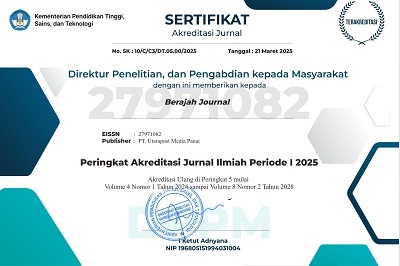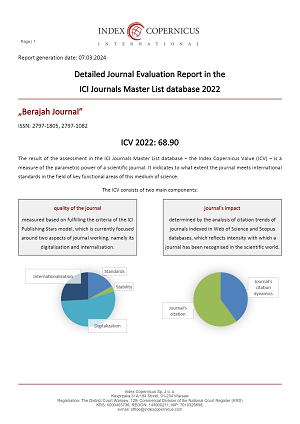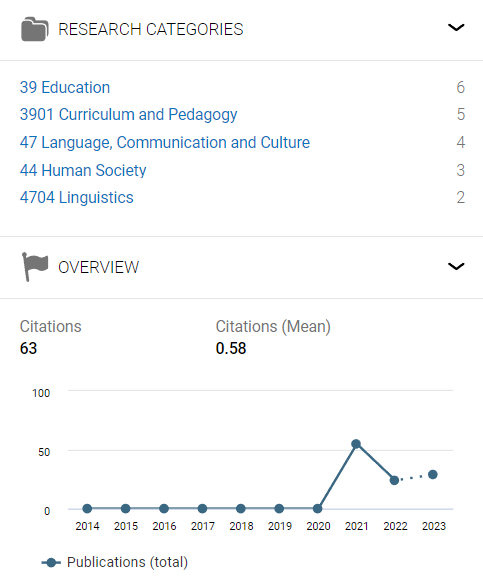PENGARUH WORKPLACE INCIVILITY TERHADAP BURNOUT DENGAN COLLECTIVISM SEBAGAI VARIABEL MODERATOR
DOI:
https://doi.org/10.47353/bj.v2i3.139Keywords:
workplace incivility, burnout, karyawan, horizontal collectivism, vertical collectivismAbstract
Penelitian ini bertujuan untuk menguji adanya pengaruh workplace incivility terhadap burnout dengan collectivism sebagai variabel moderator. Penelitian ini dilakukan pada karyawan yang bekerja di perushaan atau instansi di Indonesia yang telah bekerja selama minimal satu (1) tahun. Penelitian ini menggunakan pendekatan kuantitatif dengan metode survey. Jumlah partisipan dari penelitian ini adalah 127 orang. Hasil penelitian ini menunjukkan bahwa terdapat pengaruh yang signifikan dari workplace incivility terhadap burnout (p<0,05). Selanjutnya ditemukan juga bahwa collectivism sebagai variabel moderator tidak memoderasi pengaruh workplace incivility terhadap burnout (p=0,257; p=0,218).
Downloads
References
Akbari, J., Akbari, R., Shakerian, M., & Mahaki, B. (2017). Job demand‑control and job stress at work: A cross‑sectional study among prison staff. Journal of Education and Health Promotion, 6.
Andersson, L. M., & Pearson, C. M. (1999). Tit for tat? the spiraling effect of incivility in the workplace. Academy of Management Review, 24(3), 452–471. https://doi.org/10.5465/AMR.1999.2202131
Cortina, L. . (2008). Unseen Injustice : Incivility as Modern Discrimination in Organizations Published by : Academy of Management UNSEEN INJUSTICE : INCIVILITY AS MODERN DISCRIMINATION IN ORGANIZATIONS. Academy of Management Review, 33(1), 55–75.
Cortina, L. M., Magley, V. J., Williams, J. H., & Langhout, R. D. (2001). Incivility in the workplace: incidence and impact. Journal of Occupational Health Psychology, 6(1), 64–80. https://doi.org/10.1037/1076-8998.6.1.64
Farhati, F. R. H. F. (1996). KARAKTERISTIK PEKERJAAN, DUKUNGAN SOSIAL DAN TINGKAT BURNOUT PADA NON-HUMAN SERVICE CORPORATION. Jurnal Psikologi, 1, 1–12.
Geert, H. (1985). The interaction between national and organizational value systems. Journal of Management Studies, 22(4).
Geert Hofstede. (1980). Culture’s consequences: International differences in work-related values. CA: Sage.
Handoyo, S., Samian, Syarifah, D., & Suhariadi, F. (2018). The measurement of workplace incivility in indonesia: Evidence and construct validity. Psychology Research and Behavior Management, 11, 217–226. https://doi.org/10.2147/PRBM.S163509
Harry Charalambos Triandis. (1995). Individualism and Collectivism. In New Directions in Social Psychology. CO: Westview Press.
Katz, D. (1964). The motivational basis of organizational behavior. Behavioral Science, 9(2), 131–146. https://doi.org/10.1002/bs.3830090206
Larson, M., & Luthans, F. (2006). Potential Added Value of Psychological Capital in Predicting Work Attitudes. Journal of Leadership & Organizational Studies, 13(2), 75–92. https://doi.org/10.1177/10717919070130020601
Lim, S., Cortina, L. M., & Magley, V. J. (2008). Personal and Workgroup Incivility: Impact on Work and Health Outcomes. Journal of Applied Psychology, 93(1), 95–107. https://doi.org/10.1037/0021-9010.93.1.95
Lim, S., & Lee, A. (2011). Work and Nonwork Outcomes of Workplace incivility: Does Family Support Help? Journal of Occupational Health Psychology, 16(1), 95–111. https://doi.org/10.1037/a0021726
Liu, Weiwei, Zhou, Z. E., & Che, X. X. (2019). Effect of Workplace incivility on OCB Through Burnout: the Moderating Role of Affective Commitment. Journal of Business and Psychology, 34(5), 657–669. https://doi.org/10.1007/s10869-018-9591-4
Liu, Wu, Steve Chi, S.-C., Friedman, R., & Tsai, M.-H. (2009). Explaining Incivility in the Workplace: The Effects of Personality and Culture. Negotiation and Conflict Management Research, 2(2), 164–184. https://doi.org/10.1111/j.1750-4716.2009.00035.x
Maslach, C., Jackson, S. E., & Leiter, M. P. (1996). The Maslach Burnout Inventory Manual. The Maslach Burnout Inventory, May 2016, 191–217. https://www.researchgate.net/publication/277816643
Maslach, C., Schaufeli, W. B., & Leiter, M. P. (2001). Job Brunout. Annual Review of Psychology, 397–422.
Miner-Rubino, K., & Reed, W. D. (2010). Testing a Moderated Mediational Model of Workgroup Incivility: The Roles of Organizational Trust and Group Regard. Journal of Applied Social Psychology, 40(12), 3148–3168. https://doi.org/10.1111/j.1559-1816.2010.00695.x
Pearson, C. M., Andersson, L. M., & Porath, C. L. (2000). Assessing and attacking workplace incivility. Organizational Dynamics, 29(2), 123–137. https://doi.org/10.1016/s0090-2616(00)00019-x
Penney, L. M., & Spector, P. E. (2005). Job stress, incivility, and counterproductive work behavior (CWB): The moderating role of negative affectivity. Journal of Organizational Behavior, 26(7), 777–796. https://doi.org/10.1002/job.336
Schwartz, S. H. (1990). Individualism-collectivism: Critique and Proposed Refinements. Journal of Cross-Cultural Psychology, 21(2), 139–157. https://doi.org/10.1177/0022022190212001
Shavitt, S., Lalwani, A. K., Zhang, J., & Torelli, C. J. (2006). The horizontal/vertical distinction in cross-cultural consumer research. Journal of Consumer Psychology, 16(4), 325–342. https://doi.org/10.1207/s15327663jcp1604_3
Sianturi, M. M., & Zulkarnain, Z. (2013). Analisis work family conflict terhadap kesejahteraan psikologis pekerja. Jurnal Sains Dan Praktik Psikologi, 1(3).
Singelis, T. M., Triandis, H. C., Bhawuk, D. P. S., & Gelfand, M. J. (1995). Horizontal and Vertical Dimensions of Individualism and Collectivism: A Theoretical and Measurement Refinement. Cross-Cultural Research, 29(3), 240–275. https://doi.org/10.1177/106939719502900302
Spence Laschinger, H. K., Leiter, M., Day, A., & Gilin, D. (2009). Workplace empowerment, incivility, and burnout: Impact on staff nurse recruitment and retention outcomes. Journal of Nursing Management, 17(3), 302–311. https://doi.org/10.1111/j.1365-2834.2009.00999.x
Triandis, H. C., & Gelfand, M. J. (1998). Converging Measurement of Horizontal and Vertical Individualism and Collectivism. Journal of Personality and Social Psychology, 74(1), 118–128. https://doi.org/10.1037/0022-3514.74.1.118
Downloads
Published
How to Cite
Issue
Section
License
Copyright (c) 2022 Verina Maya Syahrani, Dewi Syarifah

This work is licensed under a Creative Commons Attribution 4.0 International License.




























